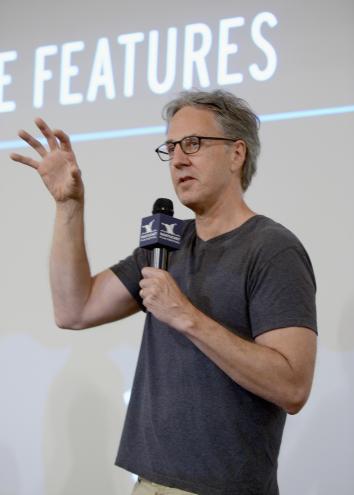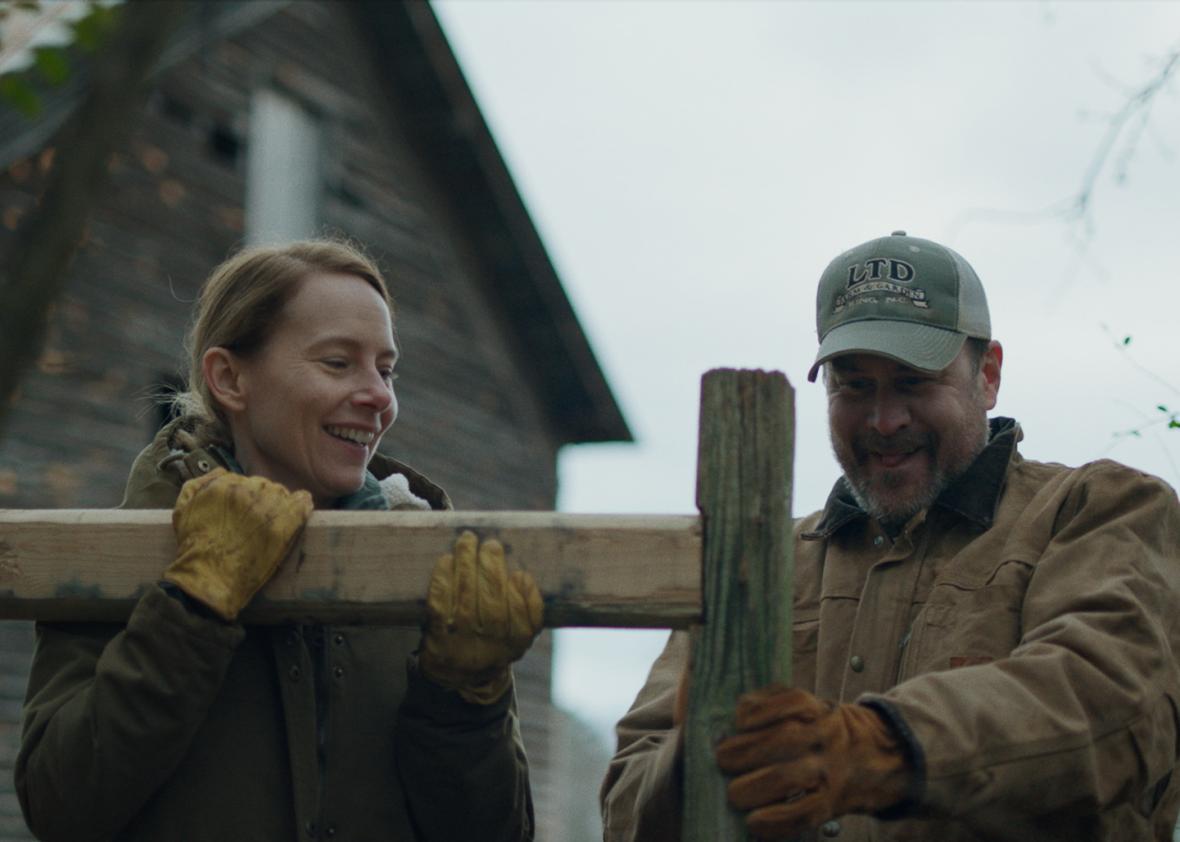In 2005, a quiet, sensitive movie set in small-town North Carolina sent an actress named Amy to an Oscar nomination. That film, Phil Morrison’s Junebug, featured a star-making turn from Amy Adams. This week that film’s screenwriter, Angus MacLachlan, releases Abundant Acreage Available, another story of small-town Tar Heels, and once again there’s a standout Amy in the cast: character actress Amy Ryan (Gone Baby Gone, The Office), who gives a much more subdued, harder-edged performance but is no less moving than that previous Amy.
The meditative Acreage is set entirely on one central North Carolina tobacco farm, as siblings Tracy (Ryan) and Jesse (Terry Kinney) cope with the death of their father and the unlikely arrival of three mysterious brothers (Max Gail, Frances Guinan, and Steve Coulter). It’s a lovely character study, a thoughtful look at people who don’t usually get to be the center of movies starring an actress who’s long deserved a lead role but never got one until now. Slate talked to Ryan and her writer-director about spinsters, believing in God, and the balls of indie film.
Slate: What part of NC did y’all shoot this in? The movie mentions a town called East Bend.
Angus MacLachlan: That is where we shot it. It’s about 40 minutes north of Winston-Salem and I think the population is less than 600.
What’s that country like?
MacLachlan: It’s on the east bend of the Yadkin River, which is why it’s called East Bend. There used to be a lot of tobacco farms but there are less and less small tobacco farmers, you see more soybean and corn. It’s beautiful country, in a sort of Andrew Wyeth way.
Amy, you had a nice Piedmont accent in this movie. Did you spend much time down there?
Amy Ryan: No, only maybe about a week before we started filming. Before that Angus had shared a documentary feature called Bright Leaves. We chose some characters from that that might have the right sound. And that’s the beauty of filming on location where a story is set. You’re hearing that sound constantly all day.
MacLachlan: Amy, you remember the security woman, the on-set security, I remember you saying she had the perfect accent.
Ryan: She was perfect. I would spend a lot of time in between takes hanging out with her.
Did you stay in town?
Ryan: There was no place to stay really. We stayed in Winston-Salem, where Angus lives. But the beauty of being on one location, this farm where the movie’s set: We worked farm hours. The sun would come up, we’d start work; the sun would go down, we’d wrap for the day. Felt very civil.
In the movie, Jesse says small farms like this one don’t make much sense anymore. Amy, why does Tracy want to stay even though she knows the limited future of the place?
Ryan: That’s all she’s ever known. On paper, yeah, it makes sense, economically the farm’s not doing well. But she’s someone who is kinda stuck, living by rote, living for other people, spending a lot of time taking care of her sick father. And now suddenly faced with: How do you live your life? A lot of people don’t answer that until it’s really up their face. Those brothers who come to the farm and camp out in the field force her to think on that.
She’s been taking care of people for so long, but she’s not a pleaser.
Ryan: I think it pleases her to be a doer. Even when she’s mad at the brothers she still is the one to make lunch. It gives her something to do and be in control.
It’s nice seeing her soften a little, with Charles, one of the brothers. Do you think she’s spent much time hoping for love?
Ryan: Not that much. I don’t think she’s someone who writes in a journal.

Getty Images for Nantucket Film Festival
The spinster used to be a pretty common archetype but that’s not a character we see or a term we use much anymore. Tracy and Charles are both kind of spinsters. Angus, what led you to characters who have that in common?
MacLachlan: I remember seeing my great-grandparents’ wedding certificate, and my great-grandmother was 25 and she was listed as a spinster.
Ryan: Oh God! I didn’t get married until I was 40.
MacLachlan: People who are caretakers, that can be common. But these are two older people, older than 25 anyway, but they are kind of made for each other. When you don’t have what we’re all told we’re supposed to have, which is a mate, and children, at some point in your life you’re left back with your family of origin.
Why do you think it’s important to tell stories where God matters to people?
MacLachlan: This is an overgeneralization but the people who are gonna see art films would not necessarily interact with many Christian, conservative people. While I don’t share all of Jesse’s beliefs, he really does love his sister. I think it’s true to those people there in that area. Religion is very important, as Amy will attest to where we had our lunches.
Ryan: Oh yes, in the fellowship hall.
MacLachlan: We had our lunches at a church right around the corner from the farm where we shot. They would have a couple of people from the church just there hosting us. The minister of the church would say grace before lunch—he was a really cool guy, and so excited to meet Max Gail because he was a huge Barney Miller fan.
Ryan: It’s odd, in terms of the location, that Tracy isn’t religious. She’s kind of a standout in that setting.
People who know and love fundamentalist Christians will recognize how exasperating it can be to deal with someone who’s always like, “I’m gonna pray for you.”
MacLachlan: And yet she’s so tolerant of him. She never really says, you’re being a jerk.
Ryan: That’s very sibling-like. You can have a big disagreement without losing a relationship with each other.
Does telling stories of people outside the arthouse film bubble seem particularly important right now?
MacLachlan: Absolutely. The whole idea about art is that we see our connections, our common shared humanity. Moonlight showed us an area that isn’t often portrayed in cinema. For an arthouse audience, I think it’s almost as uncommon to see a fundamentalist Christian character portrayed in a humane way. I don’t know who these characters voted for or what their other prejudices might be, but while you’re watching it I would hope an audience would feel right with them.
I’m a southerner. I live in North Carolina, that’s where I’m from. People have a very limited idea of what the South is.
The scene of the brothers singing “Beautiful Dreamer” reminded me, of course, of Alessandro Nivola singing that beautiful hymn in Junebug. Angus, how do you convince actors to sing in movies? Amy, were you pissed you didn’t get to sing?
Ryan: Yeah! But I’m terrible at harmonizing.
MacLachlan: Anytime you scratch an actor and ask ‘em to sing, almost all of ‘em want to.
Amy, what initially drew you to Tracy?
Ryan: I was a fan of Angus and his previous movies. But to be really honest, off the bat: I’d never played the lead before in a film. I was always, kind of, listening to other people’s problems and propping them up as they solved them. I liked that we’re gonna follow this character through the film, and what that would mean for me, the responsibilities I would have on the set.
Wait, this is really your first lead role in a movie? That seems crazy.
Ryan: Yeah. It took the balls of indie film to take a chance on me and give me a lead. I’m very grateful to Angus for that.
MacLachlan: She’s a female protagonist who’s over 35, who isn’t focused on a romantic relationship, who is her own agent—that is unusual.
Ryan: Although there is one scene where I carry a laundry basket, Angus.
MacLachlan: But you slam it down!
